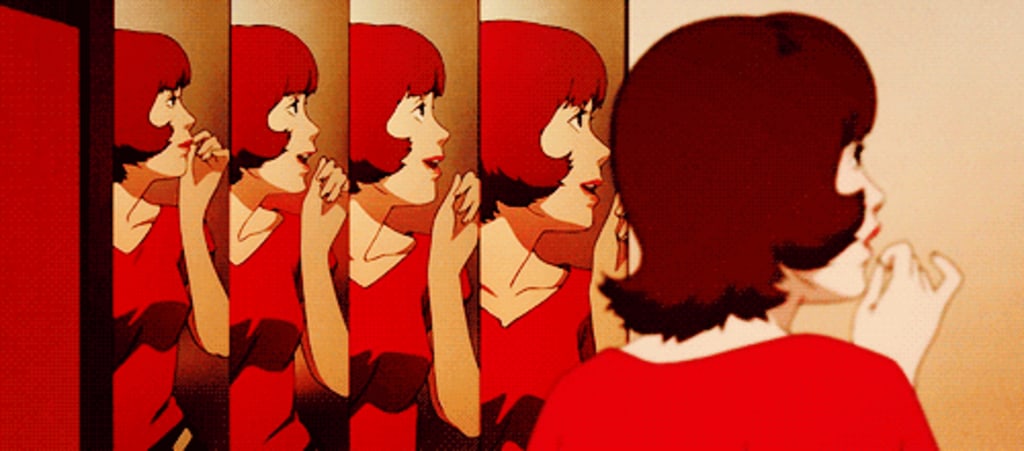Paprika: An Analysis on Madness, Control & the Subconscious Mind.
“Oh, you can’t help that,” said the Cat: “we’re all mad here. I’m mad. You’re mad.” - Alice In Wonderland.

Since "Why Perfect Blue is Futuristic" was published, it has received a lot of attention. Because of this, I wanted to write an article about my analysis for another one of Satoshi Kon's works, called Paprika.
Kon was known for animating works based on surrealism & creating complex themes. Paprika is in my opinion, one of his best works. The story, imagery and personal growth that we witness in some of the characters brings out an amazing animation.
WARNING! :
This article does touch on topics on suicide and depersonalization. If either topics make you feel uncomfortable, please refrain from reading.
"The you in you isn't the you you think is in you."
Watching the first few minutes of the film, we see our character shift from her subconscious to conscious self. Paprika is first introduced, giving a bubbly, adventurous first impression. Her red hair and brown eyes give an innocent look to the character. The scenes that the character is in is more dream-like, and whimsical. We also see a lot of bright colors surrounding the character as opposed to Dr. Chiba.
Dr. Chiba is Paprika's conscience self. She's more of a serious character and appears with more poise. Her blue slanted eyes and black hair give a bit of mystery. She's surrounded by calm and cool colors such as blue and white.
Some people explain that Paprika is Dr. Chiba's alter ego. I agree, but Paprika has a bit more independence in her decisions. Later in the film, she confronts Dr. Chiba and tells her how she wants to be her own person and do what she wants.
Susuma Hirasawa & The Parade
Having control over what we let into our mind I feel is the general theme of the movie. The parade is a symbol of madness in someone's mind.
And to be completely honest with you, the parade was one of the many things that scared me a bit. Just seeing random inanimate objects contorting themselves to the tune. And we have Susuma Hirasawa to thank for this.
Susuma Hirasawa is a musical artist and composer who makes music in New Wave/Techno-pop music. What is especially unique about his music is his voice. His voice sounds melodic and haunting like an operatic ghost. The music he sings on is a very Avante-Garde and whimsical sound.
Hirasawa first worked with Satoshi Kon to help produce the show Paranoia Agent which first aired in 2004. The opening with the characters laughing, Hirasawa vocalizing, and the dark imagery still sends chills to my spine, but at the same time, I love it.
When we watch the movie we immediately get the idea that the parade is a symbol of insanity in the film. We see Dr. Shima starting to make little sense, then run frantically with a smile on this face and try to attempt suicide.
Yeah.
We start to see the influence the parade has on people later in the film and how extremely dangerous it is.
But I personally believe that the parade is a clever idea example of how a lot of people in our world would rather see the world through rose-colored glasses, than how it actually is.
Analyzing the Parade Scene & The Messages Behind
The parade scene is something that can be confusing to some, and it's understandable. The scene in the movie is bright, crowded, and filled with different walks of life that march together in a parade, which symbolizes the loss of control not only in dreams but in real life.
It even shows suggestive themes in a more fun light, than a dark one. But seeing the over-happiness tone of the scene is a lot more chilling.
Here are some examples of what is shown in the parade:
Suicide death rates, overworking & following your dreams
The first scene as you can see here shows men in suits who dive to their deaths like a synchronized swimming team. That scene immediately shows the unsettling madness that ends up consuming most of Japan. Statistics show that in Japan, there is a huge number of people that end their lives due to overworking. We later see a scene of businessmen who turn into guitar instruments. It's an example that a good majority of people can relate to, which is wanting to chase a dream but being stuck in the culture of working a 9-5 job.
An article from CNN explains that Japan has always struggled with one of the highest suicide rates in the world. In 2016, Japan had a suicide mortality rate of 18.5 per 100,000 people, second only to South Korea in the Western Pacific region and almost double the annual global average of 10.6 per 100,000 people.
- Homelessness Statistics in Japan
This is actually something that I thought was pretty interesting for Kon to include, 3 years after his work of the 2003 film "Tokyo Godfathers. " Homelessness in Japan, according to an article from BorgenProject.com, informs that in the 1990s, significant changes in the economy led to a rise in homelessness. This is also due to the Confucian value, meaning that the homeless don't ask for money. Out of politeness, they stay of people's way. So in actuality, they basically remain poor.
- The Cash Cow Issue
This doesn't only apply to issues in Japan, but pretty much anywhere. We can, of course, identify the obvious in the U.S. Some mothers who have children will blame the father of the child in order to get more money into their pockets. It's not for the child, it's rather for themselves.
We can also see that in what degrees children "choose." Most parents will probably nag the child, telling them to attend to the highest paying career, because the other ones won't pay as much. This might have been something that Kon might have experienced, especially since he decided to be an animator. If you have the time, please check out this article, which discusses people and how they used their children as "cash cows."
- Politicians and Abusing Power
This is something that obviously isn't going to be discussed in the news. Mainly because the news provides legitimate information. (At least most anyway.) It is shown in the parade scene, that the politicians are saying that they're the "chosen one" despite the citizens saying that they didn't choose them.
I could cover all of the imagery in this scene, but then I would be spoiling it. :)
The constant battle for Power through Manipulation
We need to recognize that almost every character in the movie is somehow controlling the other for their own benefit. That being said, we can also identify that some of the "good characters" on the show aren't necessarily the best.
Dr. Chiba tries her best to control Paprika, and it makes sense as to why. She wants to at least gain control of her alter ego. But Paprika's personal intentions are different from Dr. Chiba's.
Dr. Kosaku is a mastermind who has a child-like personality. Though he struggles with particular habits such as overeating and being more mature as opposed to his colleagues, he's very intelligent and has a lot of gifts that we see particular people are jealous of. Dr. Morio has a deep hate for Kosaku but we later find out was just jealousy. He personally felt intimidated by him because he was getting the attention of Dr. Chiba, who is secretly in love with him. So in order to pursue her heart, he secretly works with Dr. Seijiro Inui.
One of my favorite scenes from the film is when Paprika is pinned to the table almost like a butterfly and is ripped open to show a sleeping Dr. Chiba. The scene is a bit abstract but it's a perfect example of how Morio sees her. It's a toxic perspective but a beautiful one.
Paprika is more than just a movie. It's a visual picture of the dystopia of our current society and our dreams. It's beautiful, scary, and confusing in its own unique way. Satoshi Kon did an amazing job in this movie, bringing the characters to life, and giving us a performance that shows surrealism in the best way.
Check out AlexEnterprises explanation of the surrealism portrayed in the film by clicking here.
---------------------------------------------------------------------------------------
Thank you so much for reading this article. I hope you enjoyed it! Tips are greatly appreciated!
About the Creator
nostalgia.radio🪲
---- Article & Fictional Writer On Vocal. Media ---
☀️ Host of the "A Collaboration of my Emotions” podcast ☀️






Comments
nostalgia.radio🪲 is not accepting comments at the moment
Want to show your support? Send them a one-off tip.